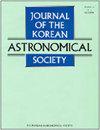星系-星系相互作用引起的晚型星系自旋的演化
IF 0.8
4区 物理与天体物理
Q3 ASTRONOMY & ASTROPHYSICS
引用次数: 0
摘要
我们使用N体/流体动力学模拟来研究类银河系通过相互作用的自旋演化。我们进行了一个共同规划星系-星系相遇的受控实验,并研究了相互作用星系的盘旋演化。具体来说,我们考虑了晚期目标星系遇到质量相同的伴星星系的情况,该伴星星系具有晚期或早期形态,最接近距离约为50kpc,无论是前进还是后退。通过检查每种情况下目标星系圆盘材料圆周速度的时间变化,我们发现,无论伴星系类型如何,目标星系都倾向于通过前进碰撞而失去自转,但几乎不会通过后退碰撞而失去。自旋的减少主要是由于潮汐破坏导致圆盘材料的轨道偏转。尽管有一些盘状物质通过流体动力学和引力相互作用或从伴星系转移物质而获得圆周速度,但事实证明,在我们设定的条件下,物质的数量通常不足以增加整个星系的自转。研究发现,在一次前进碰撞后,目标星系盘的自旋角动量减少了15-20%。我们得出结论,星系-星系相互作用的累积效应将在决定现阶段晚型星系的总角动量方面发挥重要作用。本文章由计算机程序翻译,如有差异,请以英文原文为准。
EVOLUTION OF THE SPIN OF LATE-TYPE GALAXIES CAUSED BY GALAXY-GALAXY INTERACTIONS
We use N-body/hydrodynamic simulations to study the evolution of the spin of a Milky Way-like galaxy through interactions. We perform a controlled experiment of co-planner galaxy-galaxy encounters and study the evolution of disk spins of interacting galaxies. Specifically, we consider the cases where the late-type target galaxy encounters an equally massive companion galaxy, which has either a late or an early-type morphology, with the closest approach distance of about 50 kpc, in prograde or retrograde sense. By examining the time change of the circular velocity of the disk material of the target galaxy from each case, we find that the target galaxy tends to lose the spin through prograde collisions but hardly through retrograde collisions, regardless of the companion galaxy type. The decrease of the spin results mainly from the deflection of the orbit of the disk material by tidal disruption. Although there is some disk material which gains the circular velocity through hydrodynamic as well as gravitational interactions or by transferring material from the companion galaxy, it turns out that the amount of the material is generally insufficient to increase the overall galactic spin under the conditions we set. It is found that the spin angular momentum of the target galaxy disk decreases by 15 - 20% after a prograde collision. We conclude that the accumulated effects of galaxy-galaxy interactions will play an important role in determining the total angular momentum of late-type galaxies at current stage.
求助全文
通过发布文献求助,成功后即可免费获取论文全文。
去求助
来源期刊

Journal of the Korean Astronomical Society
地学天文-天文与天体物理
CiteScore
1.30
自引率
10.00%
发文量
0
审稿时长
>12 weeks
期刊介绍:
JKAS is an international scientific journal publishing papers in all fields of astronomy and astrophysics. All manuscripts are subject to the scrutiny of referees. Manuscripts submitted to JKAS must comply with the ethics policy of JKAS. Six regular issues are published each year on February 28, April 30, June 30, August 31, October 31, and December 31. One year''s issues compose one volume.
 求助内容:
求助内容: 应助结果提醒方式:
应助结果提醒方式:


